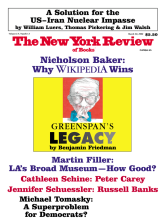On February 21, Senator Dianne Feinstein of California sent the following statement in response to the article by William Luers, Thomas Pickering, and Jim Walsh in the March 20, 2008 issue of The New York Review of Books:
“This article makes it clear that the United States has a historic opportunity to open direct talks with Iran on its nuclear program. The policy of isolation pursued by the Bush administration simply does not work. It reduces stability, and only increases the threat. Through direct engagement, the United States can identify a way to deal with the Iranian nuclear program, push to reduce Iran’s support of groups such as Hezbollah and Hamas, and promote stability in the region.
“The multilateral approach advocated in this article has many advantages. It could bring transparency to Iran’s nuclear program, bring Iran into the international community, and allow the United States to demonstrate leadership in resolving the Iranian nuclear dispute.
“It will not be easy. But I believe the steps set forth in this article are practical, doable, and forward-thinking. The authors have presented a way forward that has little if any downside, and could present a solution. It should be required reading for any serious observer of US–Iranian affairs.”
On February 20, Senator Chuck Hagel of Nebraska made the following statement:
“This article presents a powerful case for a clear, strategic change in US policy on Iran to pursue direct, unconditional, and ultimately comprehensive talks with the government of Iran. Today, our policy is failing to change the facts on the ground that Iran’s nuclear program, including its uranium enrichment program, continues essentially unchecked.
“The United States must use all of its tools of influence in its foreign policy arsenal—political, diplomatic, economic, cultural, and military—if we are to achieve any level of sustainable stability with Iran. America cannot afford any longer to refuse to consider the strategic choice of direct talks with Iran. All of us should carefully weigh the arguments that Pickering, Luers and Walsh have given us.”
This Issue
March 20, 2008



